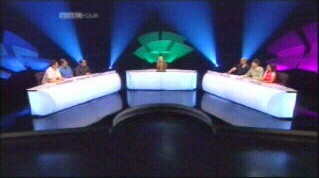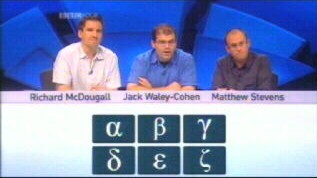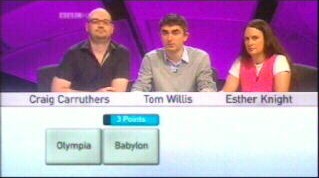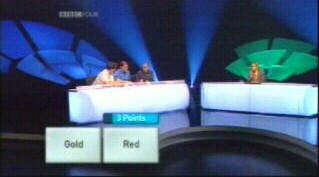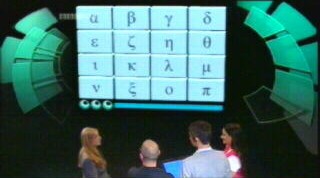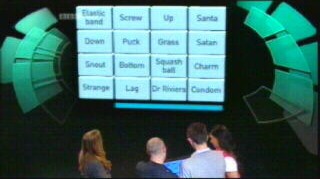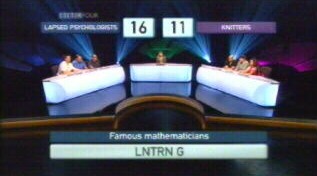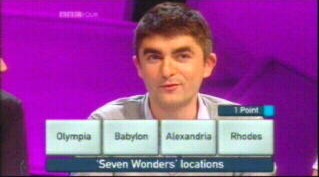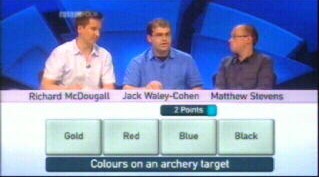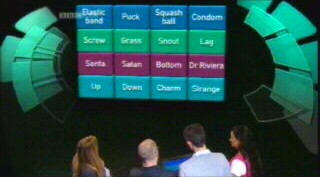Weaver's Week 2008-09-21
Last week | Weaver's Week Index | Next week
Contents |
The OC – 21 September 2008
"An exercise both wildly futile and deeply satisfying."
Only Connect
Presentable for BBC4, 8.30 Monday
Readers with very long memories will recall a spat between the BBC and RDF Media. For reasons that never made much sense to us at the time, the BBC got its knickers in a twist about a trailer that RDF had prepared, and found itself seeking a new Controller for BBC1. The Beeb picked on the most handy scapegoat and said that it wouldn't commission any new shows from RDF again, ever, or at least until everyone had forgotten about this little strop.
And so it came to pass that, a year after we reviewed RDF's last production Escape from Scorpion Island (itself back for a new series next week), we find ourselves looking at their new commission for the Beeb, Only Connect.
The show is hosted by Victoria Coren. She'll prove to be a bit snippy at times, and a touch brusque in the final round, but it's a style we can see ourselves coming to like. The set is minimalist, with lightly coloured perspex shapes and raring spotlights. If it had a video wall going round the outside, we'd be confusing it with the set to Battle of the Brains. For much of the show, the teams are shown sitting at high desks, with great acres of white space beneath. These spaces are going to come into their own very quickly in the show.
Teams of three play this game, and they've applied as a team. The members are above this acre of white space, with their full names written out – a pleasing touch. Victoria Coren has a brief introductory talk, trying to establish herself as the fount of all knowledge.
Though the rounds don't have anything quite so vulgar as names, we have to give them some sort of identification. Round One, therefore, we'll call Connect Four. Teams are shown up to four items and have 45 seconds to establish the connection between them. One point if they can establish the connection, a bonus point if the team can get the link with three items, with more points if they're able to get the links faster. The team has to press a buzzer to stop the clock and give their one guess. If their suggested link is wrong, the group gets thrown across to the other team for a bonus point.
There are three groups for each team, and they select them from a board. Nothing so common as numbers on this board – no, the questions are hidden behind Greek letters. While we like the idea of making sure the team know what they're talking about, and penalising stabs in the dark, we're not entirely convinced that using Greek letters sets the right tone: it gives critics a spurious excuse to bash the programme for elitism, when this is simply not present. There is a channel for people to watch brain-dead fluff – indeed, there are a million channels for people to watch brain-dead fluff. There are very few channels where viewers will expect to spot Pythagorean triples, let alone understand them without much further explanation.
Round two: Who's On Fourth? The teams are shown up to three items, and must establish the fourth in the series. Two points if they can get it spot on, with bonus points for any dead clever teams who require two or fewer clues.
If the opening round was a gentle warm-up (what links W, X, Y, and Z), this second stanza is clearly more difficult. Not only do the teams have to work out what connects A, B, and C, but they have to figure out what comes next in the series. In the opening show, the teams were asked "Blood, frogs, gnats". Both teams worked out that this related to the Biblical plagues, but neither could recall which was the fourth plague. Without that precise knowledge, they couldn't claim the points. Again, there are three posers for each team.
The difficulty is ramped up further for Round Three, The Connecting Wall. Here's the show's big attraction: a cross between the Wonderwall and the final round from Wipeout. The teams are shown 16 items, which will eventually link into four groups of four. They're allowed two and a half minutes to establish the groups, but once they've worked out two of the groups, they've only three attempts to complete the sets. One point per group made, one point per connection identified after the time's expired even if they didn't get the group.
This is the show's big selling point, and it looks smashing on screen. The touchpad is carefully explained, though it's a mild shame that Victoria Coren doesn't explain it by a comedy example as Paul Daniels used to do.
The programme ends with Round Four, Vwls Hft. Sets of four connected items are shown, one by one, but with the vowels removed and spaces inserted and removed. The consonants are in the correct order, but the punctuation is designed to mislead. The teams are challenged to buzz in and complete the words. This round is perhaps the weakest of the show, particularly when Coren doesn't so much chivvy the teams along as berate them for not having all the answers on the tips of their fingers.
Readers will be accustomed to the sort of thing we've done in the style of Round Britain Quiz. We found the questions to be at a level we could play along with – we were, for instance, able to get the sites of the Seven Wonders of the World in round 1 from two clues, but were completely flummoxed by one of the subsequent literary questions.
Viewers have remarked that they like the ability to score partial credit, of being able to get some of the answer but not all, or being in the right sort of area. Other general knowledge quizzes (and we're particularly looking at Mastermind), don't afford this type of "almost, but not quite right" answer.
Like many other viewers, we were shouting at the television set during the Wall, pleading with them to try combinations of quarks and captains (pick four from five) but they seemed to ignore us. Other viewers will, no doubt, be able to get one of the groups on the wall, and holler at the team. This can't be done on University Challenge, where most viewers will be patting themselves on the back after getting one question right.
For all the gamely brilliance, Only Connect feels like it's a bit of a work-in-progress. There's something slightly missing from the show. It could be that proceedings are filmed in a bare studio, without any audience at all, and without a meaningful backdrop. It could be that it's almost entirely verbal – there's one visual and one audio set in the opening round, but everything else is words. It could be that we're just not familiar with the show at this time, and it'll grow on us.
When it comes to the crunch, this is a good show. The questions are clever, it gets the brain cells ticking over, and it's well-produced. We'll keep watching.
University Challenge
Match 11: Southampton v Brighton
We begin with a Word of the Week, "stick". It's answered by Southampton, a university founded in the late 19th century by a wine merchant, and with a student populace that's said to drink more booze per capita than any other institution in the country. Alumni include Superstar Roger Black, Superstars host John Inverdale, and the chair of computer science is Tim Berners-Lee of the world wide web. Two of the side are from Dartford.
By the time we've banged all that down, Brighton is already into their first set of bonuses. The college was founded in the kitchens of the Royal Pavilion, and used to specialise in art. It became a Polytechnic and eventually a University in 1992. There's generally only one former poly on a series, so much is riding on Brighton's performance. Two of the side are medics. We're rather pleased to hear that Thumper is giving warnings "not to interrupt too soon" when reading versions of "Twinkle twinkle little star" that vary from the traditional nursery rhyme. The first visual round is on flags of British government departments that would probably confuse half of the civil servants who work in those departments, and Brighton has opened a 60-15 lead.
There are a few fans of obscure sports amongst our readership, and they'll be gratified to know that Southampton was able to identify korfball from the court's dimensions and the fact that it's a mixed sport. The teams are getting most of the starters, but they're not coping so well with the bonuses – at one point, combining for a 7/24 conversion rate. The audio round should come with a very large government health warning, for it is soap actors playing at being pop singers. It begins with Anita Dobson's assault on everyone's ears. "Why should you know?" asks Thumper of a clip of Adam Rickett's hit. Yes, such things do exist. Brighton leads by 100-50.
A series of quotations from Shakespeare about love can only be from Romeo and Juliet, except when they're not. We do like the way that the question setters put the obvious answer last in these sets. Would the Romans seriously have bathed on couches? An odd answer from Brighton there. While Brighton's getting a lot of starters, they're not making the running on the bonuses. That said, Southampton aren't doing too well themselves, and the sides on the repechage board might well survive another week. The second visual round is on signatories of historical documents, after which Brighton's lead is 165-80.
Southampton struggles with a set of bonuses on Galileo, but gets a definition of "rainbow" before anyone can even mention Bungle and Zippy. The teams don't know whether it's Asimov or Clarke they're after for science fiction, and seem to be staring each other out, asking someone else to take the guess. Southampton gets it wrong, Brighton picks up the question, and extends their lead to 70 with two minutes to play. Though Southampton gets two more starters, they still don't do well on the bonuses, and the final score sees Brighton winning by 190-135.
- St John's Cambridge 185
- Surrey 170
- Pembroke Oxford 150
- Hull 140
If only Southampton had been a little better on their bonuses! 8/30 is not a good score, even though Richard Lee had seven starters. Southampton picked up one missignal. Brighton's bonus rate was 14/35, and Ben Jordan had eight starters.
Next match: King's Cambridge v Edinburgh
And now the answers to the Only Connect examples earlier.
Mastermind
Episode 3
Do we no longer get a witty quotation to begin with? No? Oh.
Chris Atkins begins this week, the Life of Noor Inayat Khan his subject. Miss Khan was born in Moscow, educated as a child psychologist, but rose to fame after gaining a position as a spy in occupied France during the Second World War. The questions zap about her life and career, but Mr. Atkins blasts through them like no-one's business. He finishes with a perfect 17 (0).
Following that is Paul Sinha, and he's got Ferdinand Magellan. His first question is on the flagship of his round-the-world trip, and it's an error. The contender takes a little time to get going, but soon falls into the charmed circle of correct answers. Not all questions are about his circumnavigation, but this voyage does account for about half the points available. After a shaky start, he ends on a respectable 13 (1).
Christine Adam takes the Life and Major Works of Edith Wharton. The round gets off to a good start, and – in spite of a bit of a fall half-way through – also ends on a high note, 13 (1). We don't pick up much in the way of information about the subject, though.
James Corcoran will discuss The Mod Movement in Britain. Most of the questions concern the scene's heyday in the 1960s, but does move on almost to the present day. Readers are warned that it includes mention of Ocean Colour Scene, and on behalf of everyone in Birmingham, we'd like to apologise. No apologies for this round, 16 (0).
Almost inevitably, the conversation with Mr. Sinha revolves around his career: GP and stand-up comic. It's a way to make a living. He tells the tale of how Magellan went a bit mad in the Philippines, trying to change the local religion, and was put to death for his pains. We didn't realise that methane in the atmosphere absorbed the red light, making Neptune appear blue. He ends on 25 (2).
Christine Adam tells us that Edith Wharton's husband was ill much of the time, and her books reflected that gloom. Almost within moments, she's remembering the subtitle to Frankenstein, and she's dealing with the questions in very short order. Correct answers for many of them, but passes for the others, and those tend to count against. On the other hand, the speed should allow her to squeeze an extra question in. The round includes "I've started so I'll finish", and the final score is 26 (6). Five passes, but a question just started sounds like good time management.
Mr. Corcoran tells us that the Mods were "modernist" as opposed to the "traditionalist" jazz fans of the era. Do people still try to dress like their favourite actors? We remember the Rachel haircut. The whole movement was far more than punch-ups on Brighton beach, and we enjoy the appearance of quasi-mod Pete Doherty in the general knowledge round. It feels like he had a lot more passes than he did, ending on 29 (3).
Mr. Atkins requires thirteen to win, and tells us how Miss Khan was betrayed, disappeared into the German prison system, but toughed it out until she was shot. It quickly emerges that the answers will be scrambled: he doesn't recall that "Avast!" at sea means "Stop!" and not something else, like "There's an elephant on board!" In the end, he finishes on 27 (5), so Mr. Corcoran has won.
This Week And Next
The triennial Brain of Brains contest took place this week, between Christopher Hughes (Egghead), Pat Gibson (Millionaire), and Mark Bytheway (Battle of the Brains Brain). The show was played in great spirit – one question asked after an obscure reference to one of the Gospels, and the players ran rings until it turned out to be a panel-beater. Mr. Hughes gave one answer in a deep Kentucky drawl, then had to repeat it in a normal voice for the chairman's benefit. Mr. Gibson had an unfortunate run of questions through the show, and at one point encouraged the audience to show their great appreciation. We also have this contribution from the host:
- Q: In mathematics, if the first term of the Fibbonaci sequence is the number 1, what is the fifth term?
- (The answer is 5)
- Robert Robinson: Each term is produced by adding the previous two, so it begins 1, 1, 2, 3, 5, 8, 13, twenty... and so on. If there were a Most Boring Information Contest, that would win the prize.
Mr. Hughes began the show by getting three of his questions right, but Mr. Bytheway picked up two bonuses. Mr. Hughes extended his lead in the second round, but Mr. Bytheway gave the only response open to him – a Five In A Row, gaining a bonus point and the adulation of the crowd. That allowed him to overtake Mr. Hughes by one point. After the Beat the Brains round, the lead extended to four points, but a good round from Mr. Hughes enabled him to close the gap to nothing for the final round. During that round, Mr. Bytheway scores four in a row, Mr. Hughes fails to score, allowing Mr. Bytheway to win with 19 points to Mr. Hughes's 14 and Mr. Gibson's 10. Mark Bytheway now progresses to the Top Brain contest, to air next Monday.
OFCOM has been back at the wrist-slapping again. This week, it's Invicta FM in Kent, where the DJ ran a very simple quiz at 6am, and one of their callers gave the correct answer. The DJ recorded that caller but didn't play it on the day; instead, they asked for more calls the next morning before proceeding to play the bit of tape with the right answer. Invicta's investigation was criticised by OFCOM as "not being entirely thorough".
There's also been growling at Power FM in South Hampshire, for the offence of Inventing a Winner to a competition that no listener wanted to play. What links these two stations? They were both owned by GCap, the same company that was fined large amounts of money for corruption in its premium-rate contests.
An interesting announcement from EBU headquarters: juries will make up part of the scores for the Eurovision Song Contest next May. According to the press release, the winner will be decided by a mix of opinions delivered by the juries and telephone voting from members of the public watching at home. Competition supervisor Svante Stockselius stated that, "a jury takes the opportunity to listen to the songs several times before they make up their minds." Is he suggesting that people shouldn't decide on the basis of a single listen? The Eurovision Reference Group said that this move was a response to the publicity about neighbourly and disapora voting. We'll have to see the weighting attached to each element before giving a considered response.
The BARB ratings for the week to 7 September show The X Factor is still Britain's most seen game show, 9.55m tuned in for the umpteenth week of autitions. 5.15m saw Big Brother reach its conclusion – still 400,000 below the opening night's crowd – and the Strictly Come Eurovision had a respectable 4.85m. Millionaire had 4.25m on Tuesday, Dragons' Den a year's best 3.95m, and Mastermind returned to 2.35m viewers – far more than we're accustomed to. There were series bests for Masterchef: The Professionals (2.05m) and Britain's Strongest Man (1.05m).
On the digital tier, the clash with the England football game didn't hurt ITV2's Xtra Factor, 1.44m tuned in. 990,000 saw the Sunday repeat of X Factor, another series best. Big Brother's Big Mouth fell off air with 1.185m, almost double its previous best rating. 675,000 saw Come Dine With Me on E4, Celebair brought 590,000 to ITV2, and 585,000 for QI on Dave. Best score of the year for HIGHNY on Dave (480,000) and Trapped! on CBBC (230,000)
This week's highlights include the general knowledge hunt Top Brain (Radio 4, 1.30 Monday). As sure as night follows day, Strictly Come Dancing – It Takes Two returns (BBC2, 6.30 weeknights). More esoteric fare includes Gaisce Gnó (BBC2 Northern Ireland, 7.30 Monday), which sounds like an Irish-language version of Beat the Boss; and Celebrity Juice (ITV2, 10pm Wednesday), a comedy game about celebrities. Attractions for digital viewers include One Versus One Hundred (Challenge, 9pm weeknights), and The Underdog Show (Living, 8pm Thursday). Finally, Escape from Scorpion Island returns next Sunday (9am BBC2), and there's no danger of us getting the Week out that early.
To have Weaver's Week emailed to you on publication day, receive our exclusive TV roundup of the game shows in the week ahead, and chat to other ukgameshows.com readers sign up to our Yahoo! Group.


